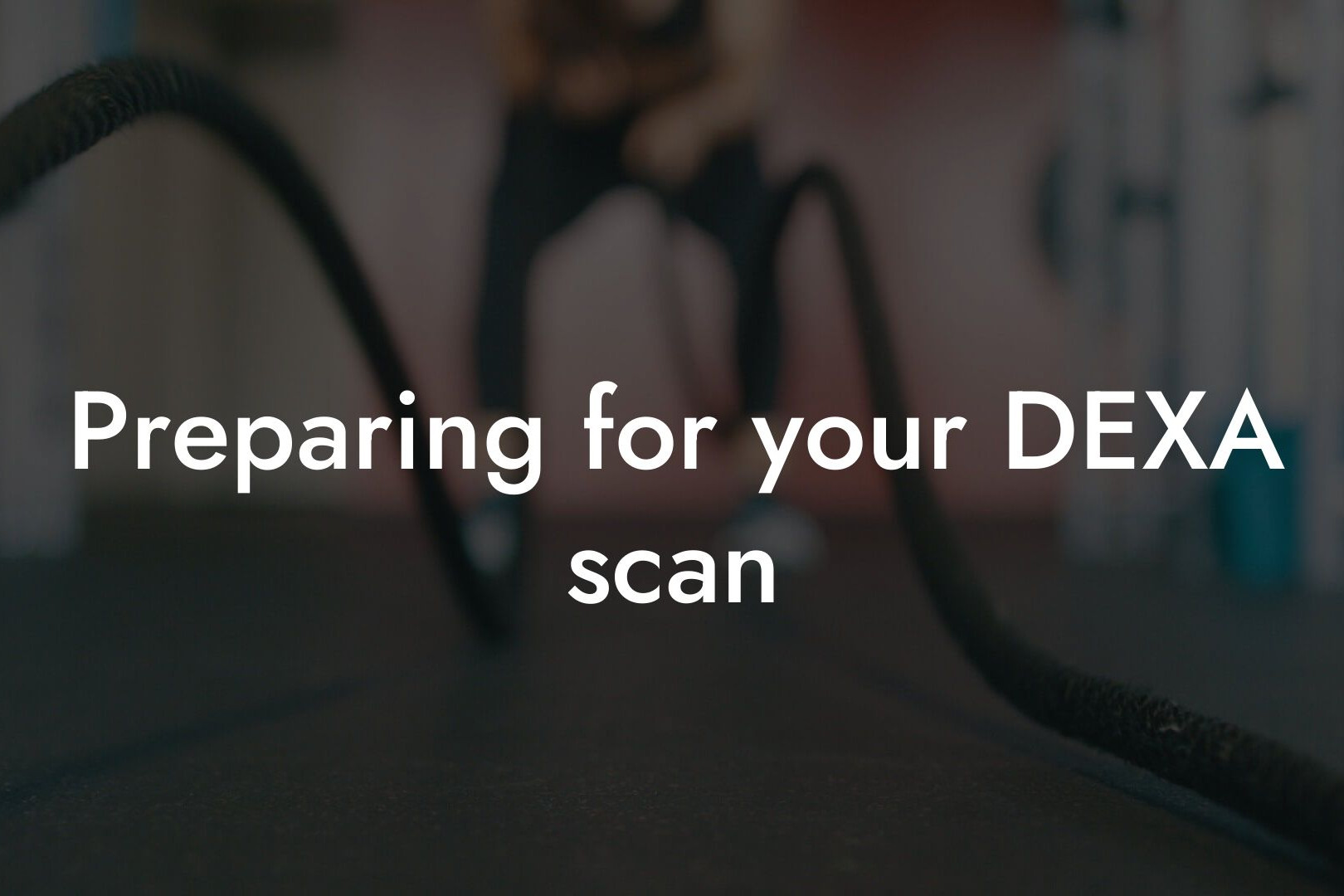As a high-earning professional, you understand the importance of maintaining a healthy and fit physique. Whether you're an athlete or simply someone who takes pride in your physical appearance, having access to accurate and reliable information about your body composition is crucial. This is where DEXA scans come in – a non-invasive, pain-free technology that provides a comprehensive assessment of your body's fat mass, lean mass, bone density, and more.
Table of Contents
What is a DEXA Scan?
A DEXA (Dual-Energy X-ray Absorptiometry) scan is a type of radiology test that uses X-rays to measure the density of various tissues in your body. It's commonly used to assess bone density, diagnose osteoporosis, and monitor the effectiveness of treatment plans. However, DEXA scans can also provide valuable insights into body composition, making them an increasingly popular tool among athletes and fitness enthusiasts.
How Does a DEXA Scan Work?
During a DEXA scan, you'll lie on a flat table while a scanner passes over your body, emitting low-level X-rays. These X-rays are absorbed by different tissues in your body, allowing the scanner to measure the density of your bones, fat, and lean mass. The entire process typically takes around 10-15 minutes, and you won't feel a thing.
What Can a DEXA Scan Measure?
A DEXA scan can provide a wealth of information about your body composition, including:
• Bone density: A DEXA scan can measure the density of your bones, helping to identify potential issues such as osteoporosis or osteopenia.
• Fat mass: DEXA scans can accurately measure your body fat percentage, including visceral fat, which is a key indicator of overall health.
• Lean mass: You'll get a precise measurement of your lean body mass, including muscle mass and water content.
• Regional body composition: A DEXA scan can break down your body composition into different regions, such as arms, legs, and trunk, providing valuable insights into muscle imbalances and areas for improvement.
Benefits of DEXA Scans for Athletes
As an athlete, a DEXA scan can be a game-changer for optimizing your performance and achieving your goals. Here are just a few benefits:
• Accurate body fat percentage: A DEXA scan provides a precise measurement of your body fat percentage, helping you to fine-tune your nutrition and training plan.
• Muscle imbalance identification: By identifying areas of muscle imbalance, you can adjust your training program to target specific areas and improve overall performance.
• Injury prevention: A DEXA scan can help identify potential areas of weakness, allowing you to take proactive steps to prevent injuries and maintain optimal performance.
Benefits of DEXA Scans for the General Population
While DEXA scans are particularly useful for athletes, they can also provide valuable insights for individuals who simply want to maintain a healthy and fit physique. Here are a few benefits:
• Accurate body fat percentage: A DEXA scan provides a precise measurement of your body fat percentage, helping you to set realistic goals and track progress.
• Health risk assessment: By measuring visceral fat, a DEXA scan can help identify potential health risks, such as cardiovascular disease and type 2 diabetes.
• Personalized nutrition and exercise planning: With a comprehensive understanding of your body composition, you can create a personalized nutrition and exercise plan tailored to your specific needs and goals.
What to Expect During a DEXA Scan
Getting a DEXA scan is a quick and easy process. Here's what you can expect:
• You'll be asked to lie on a flat table, usually on your back.
• You'll need to remove any metal objects, such as jewelry or glasses, that could interfere with the scan.
• The scanner will pass over your body, emitting low-level X-rays.
• The entire process typically takes around 10-15 minutes.
In conclusion, DEXA scans offer a wealth of benefits for both athletes and the general population. By providing accurate and reliable information about body composition, bone density, and more, DEXA scans can help you optimize your performance, achieve your fitness goals, and maintain a healthy and fit physique. At Tano Performance Group, we're committed to helping you unlock your full potential with our state-of-the-art DEXA scanning technology. Contact us today to learn more and schedule your appointment.
Frequently Asked Questions
What is a DEXA scan?
A DEXA (Dual-Energy X-ray Absorptiometry) scan is a non-invasive, painless medical test that measures bone density and body composition, including fat mass and lean mass. It's commonly used to assess osteoporosis risk, track changes in body composition, and monitor the effectiveness of training programs.
Why do athletes need DEXA scans?
Athletes require DEXA scans to monitor their body composition, track changes in muscle mass and fat percentage, and optimize their training programs. This information helps athletes fine-tune their nutrition, training, and recovery strategies to improve performance and reduce the risk of injury.
How does a DEXA scan differ from a regular X-ray?
A DEXA scan uses a much lower dose of radiation compared to a traditional X-ray, making it a safer option. Additionally, DEXA scans provide detailed information about bone density and body composition, which is not possible with a standard X-ray.
What can a DEXA scan reveal about an athlete's body composition?
A DEXA scan provides a detailed breakdown of an athlete's body composition, including fat mass, lean mass, and bone density. This information helps athletes identify areas for improvement, track changes over time, and optimize their training programs.
How accurate are DEXA scans?
DEXA scans are highly accurate, with a margin of error of around 1-2%. This makes them a reliable tool for tracking changes in body composition and bone density over time.
What is the difference between a DEXA scan and a body fat percentage measurement?
A DEXA scan provides a detailed breakdown of body composition, including fat mass, lean mass, and bone density, whereas a body fat percentage measurement only provides a single value. DEXA scans offer a more comprehensive understanding of an athlete's body composition.
Can a DEXA scan detect osteoporosis?
Yes, a DEXA scan is the gold standard for diagnosing osteoporosis. It measures bone density, which is a key indicator of osteoporosis risk. Early detection allows athletes to take proactive steps to prevent or manage the condition.
How often should athletes get a DEXA scan?
The frequency of DEXA scans depends on individual goals and needs. Athletes may benefit from regular scans (every 6-12 months) to track changes in body composition and bone density, while others may only require a scan annually or bi-annually.
What is the cost of a DEXA scan?
The cost of a DEXA scan varies depending on the location, facility, and provider. On average, the cost ranges from $100 to $300 per scan. Some insurance plans may cover the cost of a DEXA scan, especially for athletes with a history of osteoporosis or fractures.
Is a DEXA scan painful or invasive?
No, a DEXA scan is a non-invasive, painless procedure that requires no preparation or recovery time. Athletes simply lie down on a table, and the scan takes around 10-15 minutes to complete.
How does a DEXA scan work?
A DEXA scan uses two X-ray beams with different energy levels to measure bone density and body composition. The scan takes around 10-15 minutes to complete, and the results are available immediately.
What are the benefits of DEXA scans for athletes?
DEXA scans offer several benefits for athletes, including improved body composition, enhanced performance, reduced injury risk, and early detection of osteoporosis. They also provide valuable insights for optimizing training programs and nutrition strategies.
Can a DEXA scan help with weight loss?
Yes, a DEXA scan can help with weight loss by providing a detailed understanding of body composition. Athletes can use this information to create a personalized weight loss plan, focusing on fat loss while preserving lean mass.
How does a DEXA scan compare to other body composition measurement tools?
DEXA scans are considered the gold standard for measuring body composition due to their high accuracy and reliability. Other tools, such as skinfold measurements or bioelectrical impedance analysis (BIA), may not provide the same level of detail or accuracy.
Can a DEXA scan be used for athletes with implants or metal hardware?
In some cases, athletes with implants or metal hardware may not be suitable for a DEXA scan. It's essential to consult with a healthcare professional or the facility performing the scan to determine if it's safe and appropriate.
What is the difference between a DEXA scan and a hydrostatic weighing?
A DEXA scan measures bone density and body composition using X-ray technology, whereas hydrostatic weighing measures body density using water displacement. While both methods provide information about body composition, DEXA scans offer more detailed and accurate results.
Can a DEXA scan help with muscle gain?
Yes, a DEXA scan can help athletes optimize their training programs for muscle gain by providing insights into lean mass and body composition. This information allows athletes to adjust their nutrition and training strategies to support muscle growth and development.
How does a DEXA scan account for muscle imbalances?
A DEXA scan provides a detailed breakdown of lean mass and body composition, allowing athletes to identify muscle imbalances and asymmetries. This information can be used to create targeted training programs to address these imbalances and improve overall performance.
Can a DEXA scan be used for athletes with a history of fractures or osteoporosis?
Yes, a DEXA scan is particularly useful for athletes with a history of fractures or osteoporosis. It provides valuable insights into bone density, allowing athletes to take proactive steps to prevent or manage these conditions.
What is the role of a healthcare professional in interpreting DEXA scan results?
A healthcare professional plays a crucial role in interpreting DEXA scan results, providing context and guidance for athletes to understand their body composition and bone density. They can help athletes develop personalized training and nutrition plans based on the scan results.
Can a DEXA scan be used for athletes of all ages and levels?
Yes, a DEXA scan can be beneficial for athletes of all ages and levels, from recreational to elite. It provides valuable insights into body composition and bone density, allowing athletes to optimize their training programs and improve overall performance.
Here are some related articles you might love...
- How often should you get a DEXA scan?
- Preparing for your DEXA scan
- Benefits of DEXA scans for professionals
- What is a DEXA scan?
- Understanding DEXA scan results
- How DEXA scans measure body fat
- DEXA scan vs other body composition tests (e.g., BMI, calipers)
- Cost of a DEXA scan: Is it worth it?
- Accuracy of DEXA scans
Zak Faulkner
Zak Faulkner is a leading authority in the realm of physical health and body composition analysis, with over 15 years of experience helping professionals optimise their fitness and well-being. As one the experts behind Tano Performance Group, Zak has dedicated his career to providing in-depth, science-backed insights that empower clients to elevate their physical performance and overall health.
With extensive knowledge of DEXA technology, Zak specializes in delivering comprehensive body assessments that offer precise data on body fat, muscle mass, bone density, and overall physique. His expertise enables individuals to make informed decisions and achieve their fitness goals with accuracy and confidence. Zak’s approach is rooted in a deep understanding of human physiology, combined with a passion for helping clients unlock their full potential through personalised strategies.
Over the years, Zak has earned a reputation for his commitment to excellence, precision, and client-focused service. His guidance is trusted by top professionals who demand the best when it comes to their health. Whether advising on fitness programs, nutritional strategies, or long-term wellness plans, Zak Faulkner’s insights are a valuable resource for anyone serious about taking their health and fitness to the next level.
At Tano Performance Group, Zak continues to lead our Content Team revolutionising how professionals approach their physical health, offering unparalleled expertise that drives real results.




